Zee5’s most recent Indo-Pakistan venture Dhoop Ki Deewar (DKD) ended on the Independence Day weekend, with four episodes released as part of the finale. The Haseeb Hasan directorial starred Sajal Aly and Ahad Raza Mir in lead roles. Ironically, the first Pakistan-India collab about the two countries was not available to watch in Pakistan as Zee5 is currently banned in our region. So, like me, hundreds of others also resorted to pirated links to watch the show.
As discussed in our earlier review, Dhoop Ki Deewar got mired in controversy from the day its first teaser was released. Now, after watching 18 episodes, I can safely say that its narrative is not as controversial as it is notoriously claimed to be on social media, but at the same time, it is also not problem free.
Read: Dhoop Ki Deewar shows love, loss and pain are the same on both sides of the border
Keeping in mind the kind of propaganda films that are released every year in India in August (Shershaah, Bhuj: The Pride of India, Bell Bottom in 2021), DKD has its own agenda but at least it is pro peace and against war. However, I wish it was that simple!
Dhoop Ki Deewar tells the emotional story of two military families: the Ali family residing in Lahore, Pakistan, and the Malhotra’s living in Amritsar, India. Both the families lost their respective and only sons in Kashmir. Following a series of heated debates, troubles from media and demands of selfish relatives, Sara Sher Ali (Sajal) and Vishal Malhotra (Ahad) became friends who bonded over mutual grief and void that war leaves behind for the martyrs’ families.
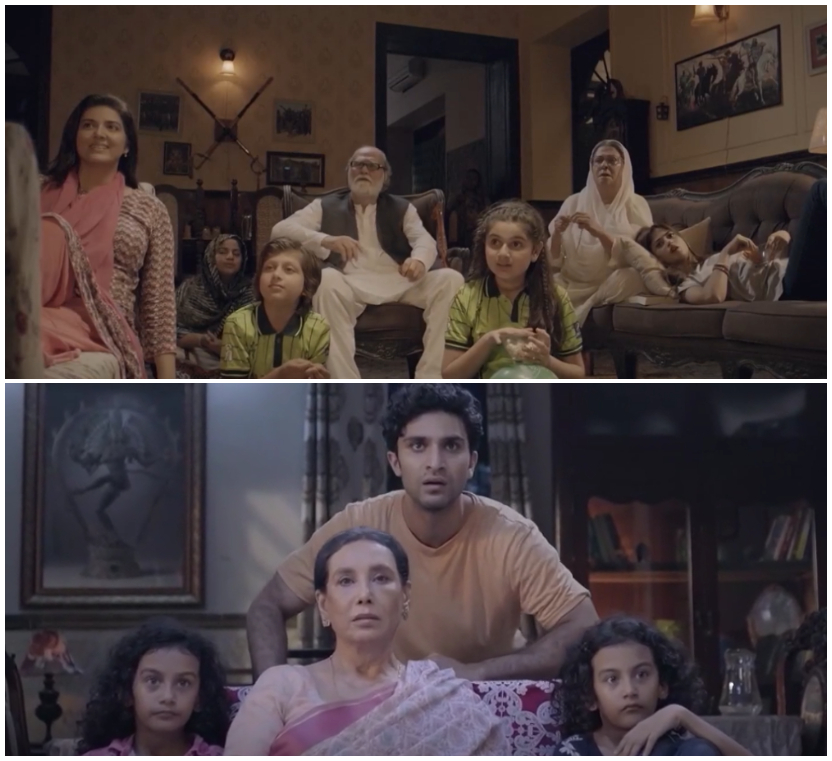
Above: the Ali family, below: the Mahotra’s
There isn’t a lot that refers to political ideologies in this series. In fact, several parallels are drawn to show how the pain is strikingly similar on both sides of the border and how countless soldiers mercilessly die in an ideological warfare. Hence, Sara and Vishal make a mutual pact that they will steer clear of armed forces. However, Vishal is the first one to break this promise for the safety of his family.
Admittedly, DKD has a lot of strong points working in its favour as a series that showcase raw human emotions. The performances are up to par and they hit the right emotional chords. The direction, though lacking when it comes to showing India, is not below standards. The ending scene where they showed the gurdwara should ideally be shot at a real location and not with a green screen to leave an impact. Nevertheless, it was the story that took a nose dive in the last few episodes.
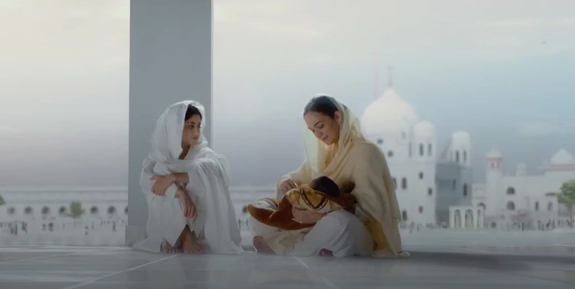
The problem arises when we consider that writer Umera Ahmed categorically declared that Dhoop Ki Deewar is “not a Hindu-Muslim love story; it is a social tragedy”. She also said that “it is not essential to have a love story if our aim is to talk about the mutual problems of the two nations”.
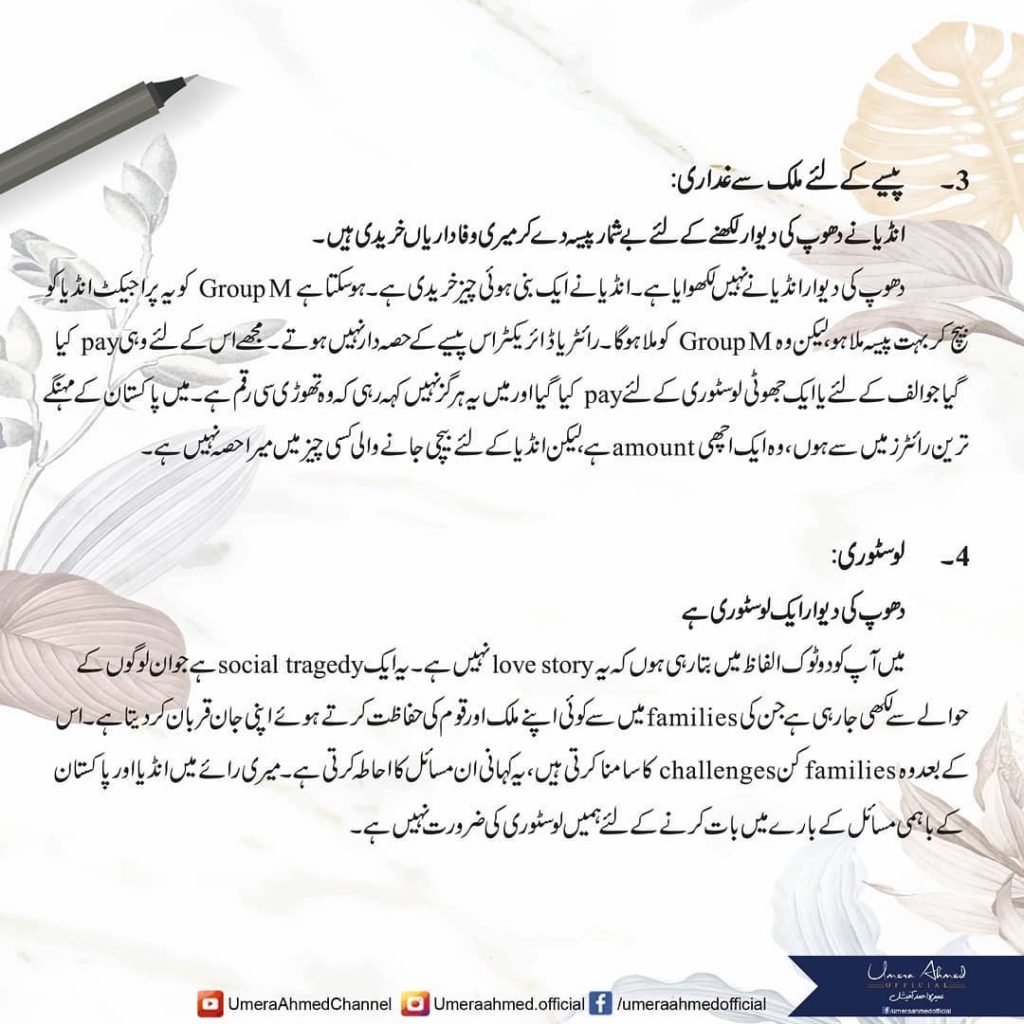
Umera Ahmed’s press statement
Wake up, anyone who sees this series and argues that Sara and Vishal didn’t love each other is living in a fool’s paradise. The relationship between them can be called anything from forbidden love, incomplete love, sacrifice in love, love that wasn’t meant to be… to star-crossed lovers but it was LOVE indeed. Calling it a social tragedy is a comment on their dilemma, and doesn’t negate the pent-up feelings the two lead characters had developed for each other.
Spoiler Alert
The way Sara reacted after Vishal joined the Indian army was a typical move by any dejected lover, who decides to get married to the first rishta available to do just what will hurt her lover the most. Can you still buy that you don’t need a love story to emphasize the divide between the two nations? Perhaps, it is possible, but it was not the case in this script.
Let’s talk about some problematic dialogues that reminded me of our “much-loved and high rated” TV dramas. Sara’s suitor, Junaid Ansar (played by Raza Talish), is a Pakistani army officer who doesn’t know first thing about a girl’s consent as he points out “Ek fauji ki beti, fauji ki biwi nahi ban’na chahti? Kafi ajeeb baat hai.” Is this an established rule that I don’t know about? After Sara’s rejection again, he says: “Jo wajah aaj mujhey aap bata rahin hein, shayad wo wajah kal na rahe.”
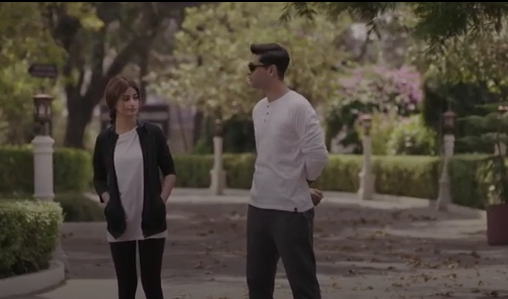
Sajal Aly as Sara Sher Ali and Raza Talish as Junaid Ansar
His parents are equally problematic because despite constant rejections, they keep asking for Sara’s hand only because it is their son’s wish. They keep giving examples of their “perfect” daughter who is also married and has a house job. There is literally a dialogue where the dad says: “Hum Junaid ki khuwahish ka ehtaraam kerte hue yahan tak aye hein”. What about the girl’s wish, daddy jee?
That’s not where this controlling behavior ends, they insist on engagement at first with a promise that she can get married after completing her studies. And then come back, craftily demanding to get them married, again citing examples of their daughter.
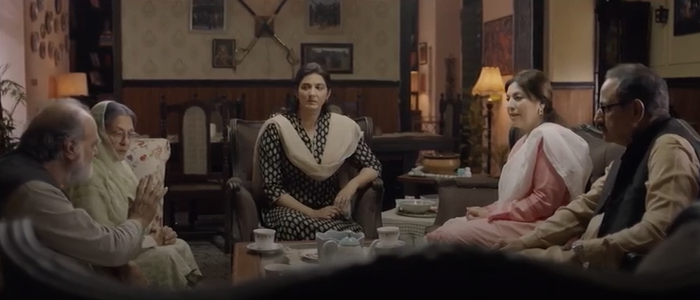
Junaid’s parents insisting on the marriage
There were instances when the elderly women nonchalantly pass sexist remarks: “sachh hay puttar hi sukhh dende nain” [sons bring peace and happiness]. Within the context of the DKD story, this holds true but within the social climate of India and Pakistan, favoring a son is not such a light-hearted discussion. The series also puts unnecessary prominence on having an armed force connection in your life, whether it is to gain power or to have a man in the house. It is implying that life is unbearable for those who are outside this circle, and even though it is a harsh reality for Indo-Pak region, isn’t it high time to talk about giving power back to the people?
The story development was too redundant and slow even for a drama-cum-tragedy, highlighting the drawback that TV series require crisp writing to get viewers engaged. Like Ek Jhoothi Love Story, DKD also seems too stretched. With two episodes every week, the pace was so sluggish that it is neither easy to wait and watch it one go, nor watch diligently every week.
Let’s wrap up with a hope that we get to see more TV series in the near future, hopefully, through proper channels, that feel like web series and not drama serials.





